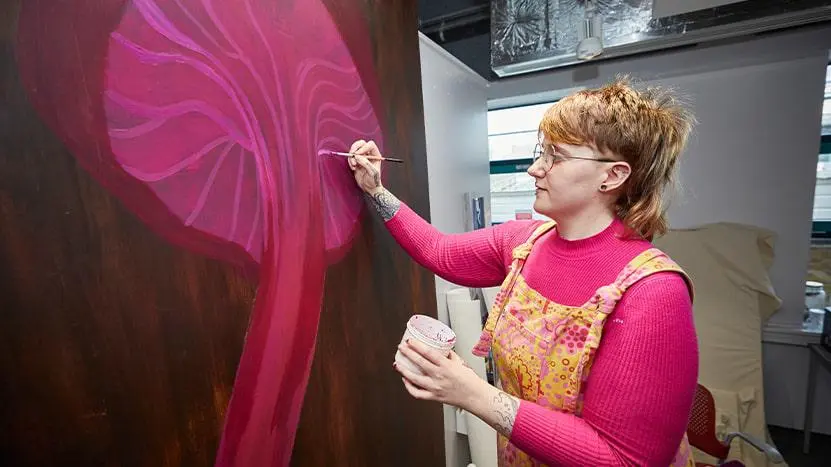
“I enjoyed having the full support of the fine art lecturers on the course.”


Nurture your talent for painting, sculpture or applied art, guided by a passionate team of artists, curators and theorists, in a supportive, creative community.
This course embraces all possible ways of making and thinking about fine art practice. You will be taught new skills and techniques and will learn how to use a variety of mediums in order to produce art to a very high standard. You will have the opportunity to pursue the mediums, ideas and processes that you are most passionate about. Students are supported to become artists but also learn skills that enable them to become entrepreneurs, teachers, art therapists and all other art related career paths.
We will nurture what is particular about you and your practice to support you to cultivate your artistic talent and grow into confident and original thinkers and makers.
Our dedicated fine art studios are equipped to enable you to reach your full potential. You will be allocated your own studio space and will have full access to a range of dedicated technical workshops, including a sculpture workshop with metalwork, welding, woodworking and casting equipment; a print-making workshop with intaglio, dry point, etching, silkscreen, woodcut and letterpress facilities; a digital print workshop with high-quality large-scale print facilities, high-end scanners and the latest software; and photography darkrooms and studios.
You will also have the opportunity to use our media academy facilities, boasting Mac suites with the latest design software, as well as a media store containing high-definition cameras, video cameras and sound equipment.
The course has strong industry and community links and you will be given the opportunity to engage in an ambitious programme of professional development alongside your own individual artistic practice. You will create an online profile and curate and show your work in group exhibitions at professional galleries within the city.

Contact international admissions
Email: Call:After successfully completing your studies, there's an opportunity to continue your studies at Solent
If you're not quite ready for a full undergraduate degree, there's alternative entry through one of our foundation years
This course has access to specialist facilities
If you have an appropriate Level 5 qualification, you can top it up to a degree in just a year
You have the opportunity to study abroad in one of our partner universities for a semester on this course
The fine art course at Solent University is ideally suited to students who want to become strong and independent creative practitioners. It is an excellent choice for those who want to acquire and develop the practical and professional skills needed to succeed within the creative industries.
Applicants should demonstrate a basic level skill set in artistic mediums, and some level of contextual understanding of art practice.
The course prepares you for a wide range of exciting career paths including, professional artist, painter, sculptor, printmaker, photographer, film maker, illustrator, art lecturer, school teacher, art therapist, curator, art critic, art journalist, art director and art entrepreneur.


Hear from Solent alumni about where their careers have taken them and how studying at Solent prepared them for their future.
Read more stories
“I enjoyed having the full support of the fine art lecturers on the course.”

The University cannot guarantee any particular members of staff will teach specific aspects of the course in the future, but will endeavour to ensure the teaching team maintains their balance of experience and qualifications.
You will be allocated personal studio space within our specially designed and recently refurbished artists’ studios, and have access to a range of dedicated specialist workshops. Facilities include: our sculpture workshop, with metalwork, welding, woodworking and casting equipment; our print-making workshop, with intaglio, dry point, etching, silkscreen, woodcut and letterpress facilities; a digital print workshop with high-quality, large-scale print facilities, high-end scanners and the latest software; as well as photography darkrooms and studios.
You will also have access to our media academy, featuring Mac suites outfitted with the latest design software, and a media store containing high-definition cameras and video cameras, sound equipment and more.
Broaden your horizons by adding an international dimension to your CV – essential to achieving success in today’s fast-changing, global environment.
Studying, working or volunteering in another country could be the experience of a lifetime. Enhance your degree by developing important global skills such as knowledge of other countries, language skills, intercultural awareness, adaptability and confidence.
For more information, please email international.mobility@solent.ac.uk.

Through this module you will explore relevant art methods, approaches, and experiment to gain insight into your practice, and progress your own unique approach, methods and thinking. Through testing, experimentation, acquiring skills and communicating with others, you continue to develop a sense of agency over your practice.
You will continue to explore relevant art methods, approaches and experiments to gain further insight into a variety of approaches in art practice, and you will establish your own unique approach, methods and thinking. Through testing, experimenting, or acquiring skills and communicating with others, you are expected to develop an increasing sense of agency over your practice.
Exploring Practice provides a supportive framework within which to take risks, show curiosity, explore and reflect on ways of making and thinking about art. In addition it provides the opportunity to explore new skills and techniques.
The module introduces pivotal modern and contemporary artworks and the contexts in which they are produced. By familiarising yourself with unconventional approaches, you can begin to think about art from a new perspective.
Introducing Practice provides a supportive framework within which to experiment, test and investigate ways of making and thinking about art. In addition it provides the opportunity to acquire new technical skills.
Many students enter university with clear ideas of who an artist is and what art is and isn’t based on “romantic” notions of the history of art. This module is intended to give students a clear grounding in both the emergence of the concept of the artist and the dominant narrative history of art in the late-modern period and an understanding of how and why these should be critiqued.
Solent’s curriculum framework builds on our unique, creative and applied approach to teaching. The transformation of students’ lives is at the heart of our mission as a university, and our curriculum – informed by the latest theory – reflects this shared educational vision.
Find out more
The student achievement team are on hand to help you succeed during your studies at Solent. They aim to contact you at key times during your time here with personalised information, advice and guidance, by email or phone.
The disability advice team provides information, advice and guidance for disabled students.
All students can access Succeed@Solent, Solent's online guide to getting better grades. It offers extensive, practical information and advice on topics such as academic writing, research and presentations.
Historically art has occupied a crucial role in driving knowledge, technology and ideas forward. Art can take a significant role in communicating progressive ideas to envision and shape societies.
As a fine artist, you may specialise in a type of art, for example, landscapes, portraits or abstract art. You may work cross different subjects and mediums such as painting, sculpture, print-making, video or photography.
Through expressive and communicative means, artists contribute to the social bodies such as museums, galleries, schools and communities. You could be exhibiting your work in professional art galleries, or running curatorial projects, delivering educational workshops or after further training even provide arts-based therapeutic workshops within the local community.

Per comission £1000 - £2000
Values can vary depending on the size and intricacy of the piece. You can expect to increase your prices with experience. The increase could vary between 10 and 20% with every major achievement, such as a sell-out show or winning an award.
Starting salary: £15,000 to £20,000
Salary scales are often related to local government administrators. Experienced arts administrators could earn £20,000 to £30,000. Typical salaries at senior management or chief executive level range from £30,000 to £60,000+ depending on the size of organisation.
Starting salary: £16,000 to £20,000
This can rise to £30,000 once you've built up experience. Senior executives at local government or arts agencies can earn salaries of over £40,000, but these roles require significant experience and are mainly strategic.
The stated salaries are published on prospects.ac.uk.


Hear from Solent alumni about where their careers have taken them and how studying at Solent prepared them for their future.
Read more stories
“I enjoyed having the full support of the fine art lecturers on the course.”

The Solent Careers team is committed to getting students into great careers.
While you are studying, the team can help you with finding work experience or placements, link you with a mentor, check your CV, or offer one-to-one guidance.
If you're in your final year, we also have graduate job opportunities just for Solent graduates.

6th
UK uni for sustained employment
Longitudinal Educational Outcomes, 2022
Every student at Solent University will also have the option to study an additional Certificate in Practical Artificial Intelligence qualification alongside their course. Free of charge, the course ensures you'll be prepared for a fantastic and varied career after graduation.


Thinking about studying further than an undergraduate degree? Alumni can get 20% off their postgraduate study.

Do you have an eye for design? Would you like to help influence the future of visual communications? Our MA Visual Communication degree is ideal for creatives keen to refine their practice, working as part of an interdisciplinary group of students.

Take charge and lead a wealth of fashion and beauty brands to success with your innovative and creative vision on this practice-based master's degree.
The tuition fees for the 2025/26 academic year are:
For further information, please visit our tuition fees page.
While most course costs are covered by your tuition fees, some essential resources and optional extras may need to be paid for separately. These additional costs are listed below. For advice on budgeting and managing your money, please contact student.funding@solent.ac.uk.
The 2025/26 other costs are not yet available. For guidance, the 2024/25 costs were:
Compulsory costs
Optional costs
Solent University offers a range of bursaries and scholarships that provide financial assistance or waive fees for tuition or accommodation. Each bursary or scholarship has specific eligibility criteria. Check out our bursaries and scholarships pages to find out more.
Solent EU Welcome Scholarship (Fee Discount)
This scholarship is available to students from an EU country, with EU nationality, who are applying for an undergraduate course starting in September 2025. The scholarship will reduce your tuition fees to £10,500 per year - this includes foundation years.
Find out more about the scholarship
Cost of living support
At Solent, we understand that the cost of living crisis may be of some concern. To help, we've put together some detailed information to show what support is available and how to make your money go further.
There is no charge to attend graduation, but you will be required to pay for the rental of your academic gown (approximately £45 per graduate, depending on your award). You may also wish to purchase official photography packages, which range in price from £15 to £200+. Graduation is not compulsory, so if you prefer to have your award sent to you, there is no cost. Extra guest tickets will go on sale after results publication and will be sold on a first-come-first-served basis. The cost per ticket is currently £15. Please note, we do not guarantee there will be any extra tickets available to purchase.
Please select an option below:
As a general guide, we look for qualifications that are equivalent to the British high school A-levels.
Applicants from outside the UK will be required to submit an electronic portfolio for consideration.
If you are applying from outside the UK, find information about entry requirements, visas and agents for your country here.
For further information about EU qualifications, please see our course entry requirements document.
For international students who do not meet the direct entry requirements for this undergraduate degree, our trusted partner, QA Higher Education offers the following pathway programme designed to develop your academic and English language skills:
As a general guide, we look for qualifications that are equivalent to the British high school A-levels.
Applicants from outside the UK will be required to submit an electronic portfolio for consideration.
If you are applying from outside the UK, find information about entry requirements, visas and agents for your country here.
For further information about UK, EU and international qualifications, please see our course entry requirements document.
For international students who do not meet the direct entry requirements for this undergraduate degree, our trusted partner, QA Higher Education offers the following pathway programme designed to develop your academic and English language skills:
All international applicants need to be aware that the English language requirements to attend Solent University, and the English language requirements to obtain a visa from the Home Office, may be different. This means that if you meet the Solent University language requirement to gain a place on the course, you may still have to meet additional requirements to be granted with a visa by the Home Office.
We strongly advise all applicants to visit the Home Office website which outlines all the requirements for a successful visa application.
Contact international admissions
Email: Call:Full-time
Any student applying for the first year of a full-time/sandwich undergraduate course must apply through UCAS (University and Colleges Admissions Service). This includes mature, overseas and EU students.
Nearly all schools and colleges offer their students the facility of applying electronically through the UCAS website using 'Apply'; it may also be used by those applying independently in the UK and overseas. This facility and all course information can be found on the UCAS website: www.ucas.com.
Your application should reach UCAS by 31 January if you hope to enter a course the following autumn. Early application is advised for the most popular subject areas. Late applications may be made until the end of June. The UCAS Code for the University is S30, code name SOLNT.
Find out what happens after you apply
Contextual offers
Solent endeavours to offer learning opportunities to students from all backgrounds. When we receive and review an application, we take into consideration the context and personal circumstances of applicants when making a decision, which means our advertised entry tariff could be reduced.
Top-up route:
We welcome applications from students currently studying a Foundation Degree, DipHE, HNC, HND or modules of an undergraduate degree course at another university, who wish to enter directly into Years 2 or 3 of one of our undergraduate degree courses. Please contact our admissions team for more information: contact us
Applicants who do not have English as their first language will be required to demonstrate an approved level of proficiency in the use of the English language. The agreed minimum requirements for this course are:
Qualifications are checked before enrolment, and international students must bring their original certificates or certified copies when coming to study at the University.
Pre-Sessional English programme
The University also offers a pre-sessional English programme for international students who wish to improve their level of English before starting a degree course.


